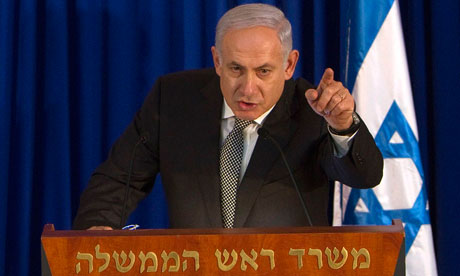Jerusalem Post editor warns Israel's 'concrete strategic assumptions liquefied almost overnight'
- guardian.co.uk,
- Article history

Binyamin Netanyahu has said Israel will review its security arrangements if Egypt reneges on the two countries' peace treaty. Photograph: Ronen Zvulun/Reuters
As pro-democracy demonstrations continue in Egypt, Israel's reaction has been of rising panic, as typified by Jerusalem Post editor David Horovitz. He today warned that Israel's "concrete strategic assumptions were liquefied almost overnight", representing a "colossal psychological blow" and a reminder that Israel is "territorially and demographically dwarfed by the seething entities arrayed around us".
Israel has been following events in Egypt and across the Middle East with mounting concern, as entrenched positions look set to shift, destabilising a status quo that has long been taken for granted.
"The Israeli government is freaking out," said Dr Shmuel Bachar, at the Israel Institute for Policy and Strategy. "For the past 30 years we have depended on Egypt's peace treaty with Israel. Now, suddenly, we have rediscovered the existence of something called an Egyptian public, the existence of which we've vigorously tried to ignore."
Israel has been troubled by sight of masses of Egyptian people on the streets calling for democratic rights, freedoms and the ousting of Hosni Mubarak. Last week senior officials reported that a dozen key Israeli embassies were urged by the foreign ministry to stress the importance of Egyptian stability to host countries. Several Israeli commentators have expressed anger at US criticism of Mubarak, arguing that is not in US or Israeli interests. In a poll published by mass-circulation daily Yediot Ahronot, 65% of Israelis think Mubarak's removal from office would be a bad thing for Israel.
Of primary concern are fears that the Muslim Brotherhood, perceived as anti-Israel and anti-Semitic, could take control and reverse relations with Israel. The treaty signed with Egypt in 1979 brought about a frosty sort of peace in practice, but it had dramatic benefits. Significantly, Israel has for decades budgeted on the assumption that it will not have to fight a war on the Egyptian front, according to Giora Eiland, a retired general and former head of the army's planning branch.
"The defence budget was more than 30% of the gross domestic product before 1979 and went down to 7% after the peace treaty," he said. "One reason for Israel's economic prosperity is that it could decrease the defence budget for all those years."
Israel's prime minister, Binyamin Netanyahu, signalled potential budgetary changes last week when he said that, should Egypt renege on the peace treaty, Israeli would "protect it with security arrangements of the ground". Several analysts point out that, in such a scenario, Israel would face an Egyptian enemy that has been the beneficiary of advanced US weaponry.
But Eiland sees other strategic worries over developments in Egypt. "If the Muslim Brotherhood takes control, there could be an immediate reaction in Palestinian society, where Hamas, the Palestinian wing of the Brotherhood, could be encouraged to take control of the West Bank."
The Palestinian Authority in the West Bank has shut down recent demonstrations in solidarity with the pro-democracy protesters in Egypt.
As well as fears over the smuggling of weapons from Egypt into Gaza, Israel is worried about potential ruptures in Jordan, resulting in a scenario whereby Israel is, according to Eiland "surrounded only by enemies, which would be a strategic change".
Although many Israeli commentators are rehearsing these fears about Islamist politics, some have questioned these reactions. "There are no religious slogans in Tahrir square, but still we look upon the Muslim Brotherhood as though it is the greatest threat," says Zvi Bar'el, veteran middle eastern affairs analyst for Haaretz newspaper. "This is how we are educated by the government and media, to see Islam as a symbol of evil."
Bar'el adds that Israelis do not register the contradiction of claiming to support democracy, but only on condition that Islamic parties such as the Palestinian Hamas or Egyptian Muslim Brotherhood are not elected. "It has no meaning if you attach these terms," he says, adding that Israel's position is: "We support democracy, as long as you keep the dictatorial regimes in place."
Dr Bachar at the IPS says that Israeli policy is based on the assumption that there are only two alternatives in the Middle East: "a dictator that can be worked with – or chaos." He cautions that Israel "needs to change the record, insert a new disc".